
Pharmacy technicians and pharmacy technician leadership from UPMC Presbyterian discuss how they became pharmacy technicians in health-system pharmacies.

Pharmacy technicians and pharmacy technician leadership from UPMC Presbyterian discuss how they became pharmacy technicians in health-system pharmacies.

Current treatment options for depression lead to discontinuation because they are slower to work and have worse adverse event profiles.

Artificial intelligence is allowing researchers to redesign the interaction between the immune system and the protein of an allergen to safely overcome symptoms.
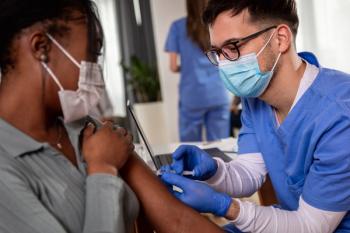
With recent outbreaks of measles and other vaccine-preventable diseases, vaccinations are more important than ever.
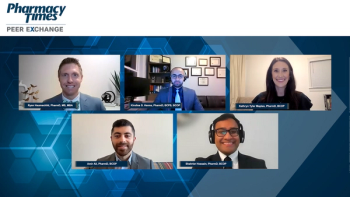
Total cost of care for multiple myeloma can be significantly affected by selection of dosing regimen.

Key opinion leaders emphasize the critical role of effective clinical pathways for treatment in multiple myeloma.

In addition to vital historical contributions, pharmacists of color are crucial in reaching marginalized communities and providing culturally competent care.
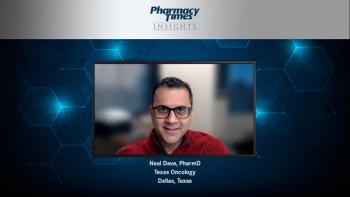
Brandon Dyson, PharmD, BCOP, BCPS, and Neal Dave, PharmD, explore the unmet needs to address in the treatment of chronic myeloid leukemia and Philadelphia chromosome-positive ALL.
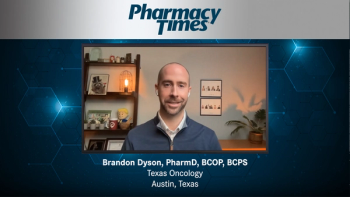
Brandon Dyson, PharmD, BCOP, BCPS, discusses the newly released 3-year data from the OPTIC trial, including the study design, baseline characteristics, and efficacy.
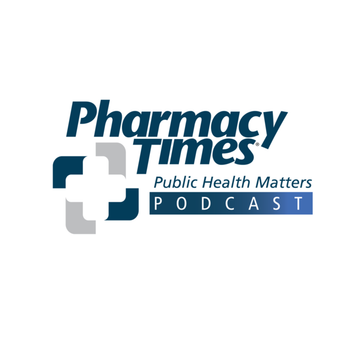
This episode features Kathy Pham, PharmD, BCPPS, who discusses her experience at the American College of Clinical Pharmacy (ACCP) and why advocacy is important to health care and the pharmacy profession.

4-drug treatment regimens could provide optimal care strategies for patients with multiple myeloma.

Experts discuss the results of the IKEMA and CANDOR trials.

Experts review the optimal imatinib dosing strategy that is recommended for patients with chronic myeloid leukemia based on the dosing from the IRIS trial.

Neal Dave, PharmD, explores how the generation of the tyrosine kinase inhibitors (TKIs) play a role in treatment selection.
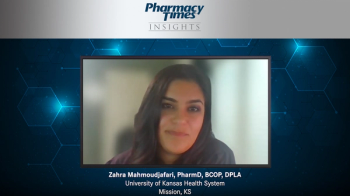
In her closing thoughts, Dr Mahmoudjafari provides an overview of cardiovascular implications associated with CLL as well as the impact of pharmacists in CLL treatment management.

On February 6, 2023, Pharmacy Times also learned that the FDA just accepted a new drug application (NDA) for this treatment.

One hypothesis suggest that our environment is too sterile.

Dr Haumschild leads a discussion surrounding key considerations when using anti-CD38 drugs.

Medical experts emphasize anti-CD38 agent utilization for treatment of patients with multiple myeloma.

Brandon Dyson, PharmD, BCOP, BCPS reviews the goals of treatment in chronic myeloid leukemia and Philadelphia chromosome–positive ALL and discusses how the goals differ from acute phase CML.

Biosimilars, staffing issues, and mail-order companies are key trends to watch.

Tracey McGrath, PharmD, pharmacy manager at Sam’s Club, shares strategies to continue exploring art and play as an adult with a busy professional life to help maintain mental and emotional wellbeing.

Dr Mahmoudjafari explores the role of BTK inhibitors in the treatment of CLL.

In her closing thoughts , Lisa Schrade, PharmD, discusses current barriers to care as well as the upcoming direction of treatment for patients with hemophilia A.

Lisa Schrade, PharmD, shares insight on the impact of inhibitors in the hemophilia A treatment landscape.

Extended half-life factor products are key contributors to successful hemophilia A treatment pathways.

Moderator Curtis E. Haas, PharmD, FCCP; Deborah Simonson, PharmD; Andrew J. Donnelly, PharmD, MBA, FASHP; Noelle Chapman, PharmD, MBA, BCPS, FASHP; Todd Nesbit, PharmD, MBA, FASHP, discuss current challenges facing health-system pharmacies as well as potential solutions in areas such as staffing and financial stress.

A panel of experts navigate the treatment landscape in multiple myeloma.

Kathryn Maples, PharmD, BCOP, provides insights regarding unmet needs in treatment for relapsed/refractory multiple myeloma.

Anthony Pudlo, PharmD, MBA, executive director of the Tennessee Pharmacists Association, discussed his presentation at the National Association of Chain Drug Stores (NACDS) 2023 Regional Chain conference.